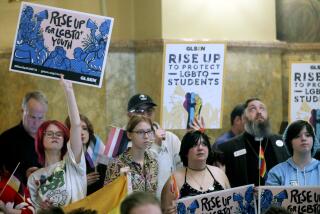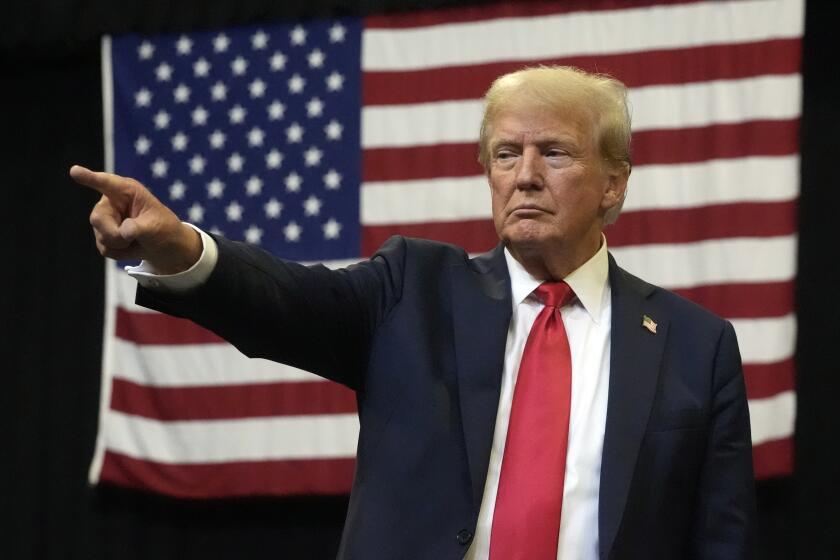Landmark civil rights law extends to LGBTQ employees, Supreme Court rules

The Supreme Court declared Monday that the historic Civil Rights Act of 1964 protects LGBTQ employees from workplace discrimination nationwide.
The 6-3 ruling, one of the most far-reaching civil rights advances in recent decades, marked a victory for lesbian, gay, bisexual, transgender and queer workers, who until now lacked legal protection in more than half the states.
The justices said the law’s ban on job discrimination on the basis of “sex” means that firing employees or not hiring them because of their sexual orientation or gender identity is illegal. Previously, Title VII of the law was most often used to prevent workplace discrimination against women.
Justice Neil M. Gorsuch, appointed by President Trump, spoke for a majority that included Chief Justice John G. Roberts Jr. and the court’s liberal justices.
While California and at least 20 other states have protected LGBTQ employees from workplace discrimination, states in the South and most of the Midwest lack such laws, which left tens of millions of workers without protection against discrimination.
Democrats in the House passed the Equality Act last year to protect lesbian, gay, bisexual, transgender and queer people from discrimination, but the Republican-controlled Senate has refused to take up the measure.
Now the high court has done so on its own, based on a strict reading of the 1964 law. The outcome defied the common prediction that the court would turn far more conservative on gay rights following the retirement of Justice Anthony M. Kennedy, the Republican appointee who wrote the court’s major gay rights decisions, including the 2015 ruling upholding same-sex marriages.
The decision is a remarkable example of a conservative justice reinterpreting the words of a landmark liberal law. Gorsuch, a former clerk for Kennedy, acknowledged the law was not originally intended to protect gay and lesbian employees. But he concluded that its words banning sex discrimination prohibited employers from making hiring or firing decisions based not only on gender, but also on sexual orientation and gender identity.
“Ours is a society of written laws. Judges are not free to overlook plain statutory commands on the strength of nothing more than suppositions about intentions or guesswork about expectations,” Gorsuch wrote in Bostock vs. Clayton County. “In Title VII, Congress adopted broad language making it illegal for an employer to rely on an employee’s sex when deciding to fire that employee. We do not hesitate to recognize today a necessary consequence of that legislative choice: An employer who fires an individual merely for being gay or transgender defies the law.”
In addition to the chief justice and Gorsuch, the decision was joined by Justices Ruth Bader Ginsburg, Stephen Breyer, Sonia Sotomayor and Elena Kagan. In dissent were Justices Clarence Thomas, Samuel A. Alito Jr. and Brett M. Kavanaugh.
The ruling came as a shock to many, even though Gorsuch had signaled during the oral argument in October that the case was “really close.” Gorsuch had promised in his confirmation hearings that he would follow the words of the law and be guided by what it said, not by his view of a good policy or the intentions of the legislature. And these cases fit that model.
Roberts’ decision to join in the ruling was also a surprise. He had strongly dissented when the court upheld same-sex marriages.
Former Vice President Joe Biden, the Democratic candidate for president, called the ruling “a momentous step forward for our country. Before today, in more than half of states, LGBTQ+ people could get married one day and be fired from their job the next day under state law, simply because of who they are or who they love.”
President Trump, whose administration has moved aggressively to curtail transgender rights, said he had read the decision and found it to be “very powerful.... Some people were surprised. But they’ve ruled and we live with their decision.”
His administration joined the case on the side of employers and argued against protecting LGBTQ employees from discrimination under federal law.
While Monday’s decision is a landmark victory for LGBTQ employees, it was based on the court’s legal interpretation of an existing law passed by Congress, not constitutional guarantees, as was the case with several previous rulings on LGBTQ rights.
It is also does not guarantee that the high court will be a friendly forum for gay rights in the future. Gorsuch and the court’s conservatives are also champions of religious rights, and they have signaled a willingness to look favorably on claims from religious-minded people who refuse to participate in same-sex marriages or work with gay couples in arranging adoptions or foster care. Future cases will be instrumental in forging the balance between gay rights and religious liberties.
Still pending before the high court are cases on abortion, Dreamers, religious schools and Trump’s tax returns, all of which could yield significant victories for conservatives and the administration.
But Monday saw surprising setbacks for conservatives on two other fronts, in addition to the far-reaching ruling upholding gay rights. The court turned down a series of 2nd Amendment appeals in which gun rights advocates urged the court to uphold a right to carry a weapon in public. Many states, including California, strictly regulate the carrying of concealed guns.
The justices also turned away Trump’s challenge to a California “sanctuary” law that limits police from aiding federal agents who seek to take custody of immigrants.
Conservative activists were quick to slam Trump’s first court appointee.
Carrie Severino, president of the Judicial Crisis Network which funded ad campaigns in support of Gorsuch and Kavanaugh, called Monday’s decision the “hijacking of textualism. Justice Scalia would be disappointed that his successor has bungled textualism so badly today, for the sake of appealing to college campuses and editorial boards.”
Gay rights advocates celebrated a victory that was decades in the making.
“This is a landmark victory for LGBTQ equality,” said Alphonso David, president of the Human Rights Campaign. “No one should be denied a job or fired simply because of who they are or whom they love. For the past two decades, federal courts have determined that discrimination on the basis of LGBTQ status is unlawful discrimination under federal law. Today’s historic ruling by the Supreme Court affirms that view.”
The case decided Monday arose when Gerald Bostock was fired from his job as a child welfare advocate for Clayton County just south of Atlanta shortly after he joined a gay softball league. He lost his case in federal courts in Georgia. His case was combined with two others in which courts in New York and Michigan ruled for gay or transgender employees.
“There are truly no words to describe just how elated I am,” said Bostock, the lead plaintiff. “When I was fired seven years ago, I was devastated. Today we can go to work without the fear of being fired for who we are and who we love.”
The two other plaintiffs have passed away. Donald Zarda was a sky-diving instructor in New York who was fired after telling a customer he was gay. He later died in a sky-diving accident. Aimee Stephens had worked at a funeral home in Detroit, but was fired after she returned to work as a woman. She died last month.
Alito wrote a long dissent, joined by Thomas, that condemned the decision as judicial lawmaking. “There is only one word for what the court has done today: legislation,” Alito wrote.
Alito predicted the court’s decision would affect numerous pending legal battles over rights for transgender people, including disputes over coverage exclusions in health plans and use of school bathrooms.
“Although the court does not want to think about the consequences of its decision, we will not be able to avoid those issues for long,” Alito wrote. “The entire federal judiciary will be mired for years in disputes about the reach of the court’s reasoning.”
Kavanaugh, in a separate dissent, took a milder tone. He said it was up to Congress to pass such protections, not the court. But he signaled some support for the outcome.
“Notwithstanding my concern about the court’s transgression of the Constitution’s separation of powers, it is appropriate to acknowledge the important victory achieved today by gay and lesbian Americans,” he wrote. “Millions of gay and lesbian Americans have worked hard for many decades to achieve equal treatment in fact and in law. They have exhibited extraordinary vision, tenacity, and grit — battling often steep odds in the legislative and judicial arenas, not to mention in their daily lives. They have advanced powerful policy arguments and can take pride in today’s result.”
More to Read
Get the L.A. Times Politics newsletter
Deeply reported insights into legislation, politics and policy from Sacramento, Washington and beyond. In your inbox three times per week.
You may occasionally receive promotional content from the Los Angeles Times.











